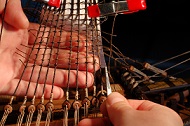Maritime Arbitration- Legal Perspectives
 Courts can no longer individually address the issue of conflict resolution and as such the modern business world requires an alternative means of conflict resolution to meet its demands. A need arises for a legal mechanism through which parties can resolve their disputes quickly, fairly, efficiently, with flexibility and freedom that the court cannot provide. The reason for this is because of the continuous development of trade and services, the resulting complexity of transactions, and the subsequent need for speed and efficiency.
Courts can no longer individually address the issue of conflict resolution and as such the modern business world requires an alternative means of conflict resolution to meet its demands. A need arises for a legal mechanism through which parties can resolve their disputes quickly, fairly, efficiently, with flexibility and freedom that the court cannot provide. The reason for this is because of the continuous development of trade and services, the resulting complexity of transactions, and the subsequent need for speed and efficiency.
This increased interest in an alternative means of conflict resolution within judicial systems that has arisen because it provides such flexibility and speed. This form of conflict resolution would ensure the participation of all parties and maintain confidentiality while finding a solution to their dispute. The fact that in the past half a century, such an alternative means of conflict resolution has earned a prominent place in the global legal and economic sector has resulted in an increased jurisprudential and legislative movement. Said action regulates the alternative means by striving to find an appropriate framework to ensure that these means are codified and applied in an efficient manner that achieves justice and maintains rights.
The vast expansion of economic development rates and the spread of intra-state trade have led to the emergence of new and modern trade methods. As trade and economic relations, interests, and objectives diverge, many related problems have emerged. To ensure justice within this rapid movement, methods to solve these problems have developed. An arbitration system has been established to make up for the failure of national law, judicial understanding, and trade customs' inability to keep pace with the rapid changes. Such an arbitration system is used as a method of peaceful settlement of disputes and is separated from the ordinary judicial settlement.
On-Shore Basics
With the spread of the arbitration system as a method of peaceful settlement of disputes and with the simultaneous development of maritime transportation activities and maritime commercial transactions between various countries of the worlds, there has been an increase in maritime arbitration disputes. Arbitration process is subject to certain formal requirements. Almost all arbitration rules either of national - Spain, Italy, Belgium, the Netherlands, Germany, United States, Switzerland, England, Peru, among many others - or international origin - the New York Convention on the Recognition and Enforcement of Foreign Arbitration Awards of 1958, the original version of the UNCITRAL Model Law on International Commercial Arbitration of 1985, or the Model Law amended version of 2006 - presuppose the arbitration agreement to fulfill certain crucial formal qualifications{C}{C}[i].
Maritime contracts of different types can be found amongst the international community of which require dispute settlement outside the scope of normal litigation procedures. Charter Parties for instance use variety of different forms for different trades and commercial purposes. Modern charter party forms such as BIMCO9 provide standard templates for charter parties, bills of lading, and other standard agreements. Arbitration clause by default are featured in most forms. The form and content of arbitration clauses contained in charter parties may vary from one another in terms of appointment of arbitrator, number of arbitrators, venue for arbitration, etc{C}{C}[ii].
Given the commercial, economic, and global nature of these maritime contracts, maritime arbitration has been of great importance in resolving disputes between parties. Perhaps the most important characteristic of maritime arbitration from within the jurisdiction of each state is the prior consent that is required by the parties to abide any arbitral award that is issued in a dispute between them and the ease of the arbitration procedure that would occur.
Further, unlike ordinary judicial procedures, the lack of public participation in an arbitration dispute is beneficial. This promotes both confidentiality and efficiency in resolving a dispute. It removes the fear of competition and the speculation of third party influence. Also, the technical nature of maritime disputes are based mainly on established maritime customs and as such require the availability of arbitrators and lawyers that are highly equipped with technical expertise and knowledge of maritime issues, international conventions, treaties, customs and rules of justice and customary fairness.
Like any case of arbitration, maritime arbitration is resorted to either by prior agreement as per the signed contract between the parties to the dispute which contains an arbitration clause or based on an arbitration agreement that occurs after the conflict between the parties. The arbitration may be freely chosen by the parties or institutionalized. If it is freely chosen it is termed as ad hoc arbitration, the parties are free to determine where the arbitration will take place, i.e. which rules and procedures will be followed whether substantive or procedural. On the other hand, if it is institutionalized this means that the arbitration will be undertaken by an international organization or body and in agreement with the rules and procedures in place and pre-defined by international conventions and resolutions.
Arbitration centers have increased in popularity after the Second World War where their use has expanded free trade and international trade. Each arbitration center has specialties in different types of trade of which include cotton trade or grain trade. One type of specialty is for maritime, and some institutes include the Maritime Arbitration Association of New York, the Association of Maritime Arbitrators in London, the Maritime Arbitration Chamber of Paris, and the International Maritime Arbitration Organization.
Anchoring the Technicalities
 Maritime dispute resolution can be said to be historically the oldest form of institutional arbitration. It gives individuals the freedom to choose arbitrates which they trust based on their experience in dispute resolution. The rules and procedures used to resolve disputes are seen to be more flexible and realistic than those used in other general institutional arbitration. Another known benefit of the maritime arbitration system is the requirement of confidentiality and the ensured speed during dispute resolution. One limit, however, is that maritime arbitration can sometimes be restricted to institutional arbitration, especially in private disputes in which a country is not a party. Institutional arbitration is the basis of international trade, and a majority of parties use it for most arbitral matters to avoid the issue of inexperience when choosing arbitral rules and procedures that would follow if choosing the ad hoc arbitration system.
Maritime dispute resolution can be said to be historically the oldest form of institutional arbitration. It gives individuals the freedom to choose arbitrates which they trust based on their experience in dispute resolution. The rules and procedures used to resolve disputes are seen to be more flexible and realistic than those used in other general institutional arbitration. Another known benefit of the maritime arbitration system is the requirement of confidentiality and the ensured speed during dispute resolution. One limit, however, is that maritime arbitration can sometimes be restricted to institutional arbitration, especially in private disputes in which a country is not a party. Institutional arbitration is the basis of international trade, and a majority of parties use it for most arbitral matters to avoid the issue of inexperience when choosing arbitral rules and procedures that would follow if choosing the ad hoc arbitration system.
Thus, it remains important to distinguish between institutional arbitration and ad hoc arbitration by examining the differences between them. There is no doubt that the procedural methods used are the most important signifiers. While parties to ad hoc arbitration choose the rules and procedures they would like applied, parties to institutional arbitration do not have that freedom. As such the distinction between institutional arbitration and ad hoc arbitration lies in the failure of ad hoc arbitration in the two most important elements found in institutional arbitration: first, a permanent arbitration center with an organizational structure, a board of directors, a list of arbitration, and arbitration regulation. The second element is that the arbitration center, through the Secretariat and the administrative bodies, must organize, manage, and supervise the arbitral process from the receipt of arbitration applications until the decision of the arbitral tribunal.
It should be noted that the reference in the arbitration agreement to an arbitral institution should not be immediately judged as institutional arbitration. Rather, it should be examined based on whether the agreement requires the availability of the two pre-eminent elements in institutional arbitration. In summary, unless the agreement between the parties indicates the use of institutionalized arbitration, bearing in mind that the two elements referred above are required, ad hoc arbitration will be what is agreed upon.
Based on the above discussion, institutional arbitration, by its advantages, is the best means of resolving maritime disputes. It provides the parties with confidence in the expertise and specialization of the arbitrators in the dispute and through the use of well-known permanent centers. Further, certifying the availability of competent staff that monitors the arbitration process from beginning to end.
In essence, institutionalized arbitration centers will have jurisdiction to resolve maritime disputes between parties, appoint arbitrators, maritime experts, interpret maritime contracts, and determine the appropriate work and training required for all parties associated. These disputes will be resolved between natural persons and public, legal, or private persons. Maritime disputes may arise from all types of maritime contracts. These include insurance contracts from maritime collisions, loss settlement, and environmental disputes that result from the flow of petroleum products, pollution, or catastrophic damage that resulted from conflicts. Further, they may include disputes arising from maritime trade, traffic, rental operations under bills of lading and all other agreements that fall within the jurisdiction of maritime courts.
Conclusion
Due to the growing maritime activity in the region, the enthusiasm of the stakeholders and the belief in the efficiency of arbitration, the Government of Dubai has initiated the establishment of the Emirates Maritime Arbitration Center (EMAC) by Decree Number 14 of 2016 establishing the Emirates Maritime Arbitration Center, which was issued by His Highness Sheikh Mohammed Bin Rashid Al Maktoum as the Ruler of Dubai and in line with international standards and regulations. The Center aims to settle local and international maritime disputes by using efficient and effective alternative dispute resolution methods. It seeks to strengthen maritime arbitration procedures to be more fair and transparent, through flexible and neutral mechanisms, to promote awareness of the practice of maritime arbitration locally, regionally and internationally. The role of the Center also includes supervision of mediation and arbitration per the applicable regulations to provide its services with transparency and integrity.
The uniqueness of EMAC is that it provides mediation services in addition to arbitration. Parties desiring to enter into mediation are required to pay a sum of UAE Dirhams five thousand (AED 5,000) towards administrative fees and registration fees. Fees payable to mediators are determined on hourly basis and in consultation with each of the mediators, the parties and the Centre.
The main aim of this center is to provide the best services to the maritime sector through a specialized center to resolve all maritime disputes with the speed and efficiency required and to enhance Dubai's competitive position in this important area at both regional and international level. We look forward to the issuance of important arbitral judgments from this essential center, which will work towards the establishment of legal rules that support maritime trade.
[i] Mota, Carlos Esplugues. "Validity and Effects of the Incorporation by Reference of Arbitration Agreements in International Maritime Arbitration: Current Situation and Future Trends." Revista de Drept Maritim 5.1 (2015): 64-94.
[ii] Supra, note i
 English
English
 عربي
عربي Русский
Русский 官话
官话 português
português
 Türk
Türk 



.jpg&w=120&h=80&zc=1)











.jpg&w=120&h=80&zc=1)












